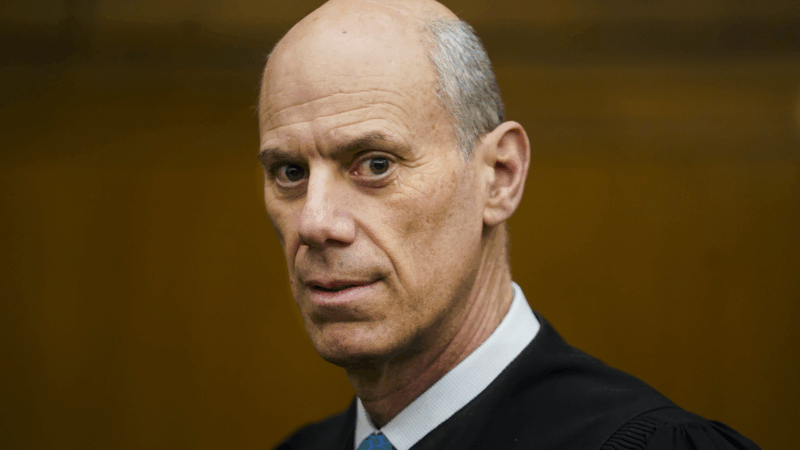Judge: ‘Probable cause’ to hold U.S. in contempt over Alien Enemies Act deportations
Judge James Boasberg of the U.S. District Court in the District of Columbia ruled Wednesday that there is “probable cause” to find the Trump administration in criminal contempt of court for violating his order last month to immediately pause any deportations under the Alien Enemies Act.
President Trump on March 15 invoked the 1798 Alien Enemies Act to target members of Tren de Aragua, a Venezuelan prison gang that Trump says is invading the U.S.
The government sent several planeloads of alleged gang members to El Salvador immediately after invoking the act, including 137 people under the statute, the White House said at the time.
The flights happened just after the American Civil Liberties Union and Democracy Forward sued the Trump administration over its use of the Alien Enemies Act. They said the administration removed people without due process.
Boasberg imposed a temporary restraining order barring deportations that evening — but the planes still arrived in El Salvador. The Justice Department argued that Boasberg had overstepped his authority by inserting himself into questions of foreign policy.
But Boasberg wasn’t convinced.
He said that while he issued the order temporarily pausing the flight, “those individuals were on planes being flown overseas, having been spirited out of the United States by the Government before they could vindicate their due-process rights by contesting their removability in a federal court, as the law requires.”
“The Court ultimately determines that the Government’s actions on that day demonstrate a willful disregard for its Order, sufficient for the Court to conclude that probable cause exists to find the Government in criminal contempt,” Boasberg wrote on Wednesday. “The Court does not reach such conclusion lightly or hastily; indeed, it has given Defendants ample opportunity to rectify or explain their actions. None of their responses has been satisfactory.”
Government faces April 23 deadline
Boasberg gave the federal government until April 23 to respond to try to “purge their contempt” and prove they did not violate his temporary restraining order.
Alternatively, the government must provide the name of the person or people who chose not to halt Alien Enemies Act deportations out of the U.S. despite his order — and Boasberg said he would refer them for prosecution.
An order of criminal contempt is a crime and can carry a fine or prison sentence.
The Supreme Court weighed in on the case last week, saying the ACLU and Democracy Forward should have brought their suits in a different court, and under a different statute. But it didn’t rule on the underlying constitutionality of Trump’s invocation of the Alien Enemies Act, and also said any alleged gang members deported under the act need to be given notice of deportation and the opportunity to contest it.
“That Court’s later determination that the TRO [temporary restraining order] suffered from a legal defect, however, does not excuse the Government’s violation,” Boasberg said about the Supreme Court’s opinion, referring to his temporary restraining order. “If a party chooses to disobey the order — rather than wait for it to be reversed through the judicial process — such disobedience is punishable as contempt, notwithstanding any later-revealed deficiencies in the order.”
“The Constitution does not tolerate willful disobedience of judicial orders — especially by officials of a coordinate branch who have sworn an oath to uphold it,” he added.
Democracy Forward, one of the groups suing to block the order, said it would continue to defend its clients and fight for their due process.
“Today’s decision affirms what we have long known: the government’s conduct in this case is unlawful and a threat to people and our constitution,” Skye Perryman, president and CEO of Democracy Forward, said in a statement.
HUD proposes time limits and work requirements for rental aid
The rule would allow housing agencies and landlords to impose such requirements "to encourage self-sufficiency." Critics say most who can work already do, but their wages are low.
Paramount and Warner Bros’ deal is about merging studios, and a whole lot more
The nearly $111 billion marriage would unite Paramount and Warner film studios, streamers and television properties — including CNN — under the control of the wealthy Ellison family.
A new film follows Paul McCartney’s 2nd act after The Beatles’ breakup
While previous documentaries captured the frenzy of Beatlemania, Man on the Run focuses on McCartney in the years between the band's breakup and John Lennon's death.
An aspiring dancer. A wealthy benefactor. And ‘Dreams’ turned to nightmare
A new psychological drama from Mexican filmmaker Michel Franco centers on the torrid affair between a wealthy San Francisco philanthropist and an undocumented immigrant who aspires to be a dancer.
Bill making the Public Service Commission an appointed board is dead for the session
Usually when discussing legislative action, the focus is on what's moving forward. But plenty of bills in a legislature stall or even die. Leaders in the Alabama legislature say a bill involving the Public Service Commission is dead for the session. We get details on that from Todd Stacy, host of Capitol Journal on Alabama Public Television.
My doctor keeps focusing on my weight. What other health metrics matter more?
Our Real Talk with a Doc columnist explains how to push back if your doctor's obsessed with weight loss. And what other health metrics matter more instead.







